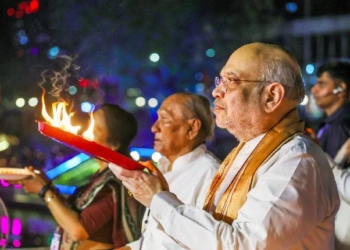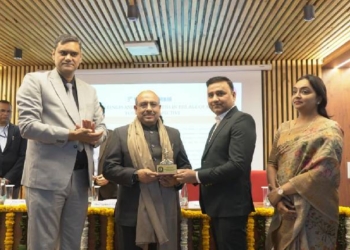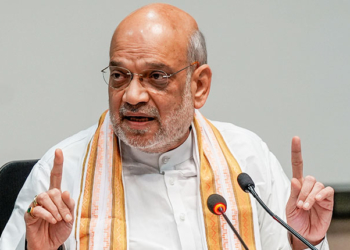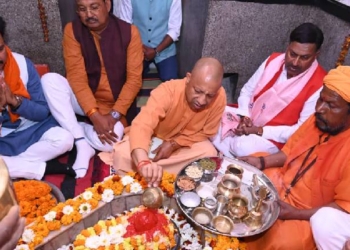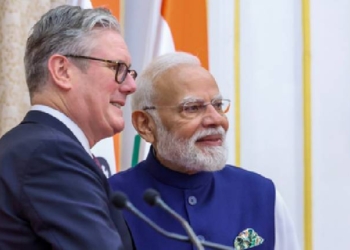Gurugram: Union Home Minister Amit Shah while inaugurating a two-day exhibition on crime and security in Gurugram on Thursday appreciated the efforts taken by the Haryana government in the field of cyber security. The exhibition was part of a G20 conference on ‘Crime and Security in the age of Non–Fungible Token (NFT), Artificial Intelligence (AI) and Metaverse’.
The exhibition showcased various initiatives and achievements of the Haryana government in the field of cyber security.
The Home Minister lauded various police reform programmes taken up by the state, which include establishment of a Cyber Forensic Lab in Panchkula, a cyber helpline 1930, 318 cyber help desks, and 29 cyber police stations. He said the state government is performing its responsibility effectively.
Further, addressing the inaugural session of the G20 conference, Shah said that the theme of India’s G-20 presidency is “Vasudhaiva Kutumbakam” or “One Earth – One Family – One Future”, which reflects the country’s cultural heritage.
“Cyber security is no longer confined to the digital world only. It has become a subject of national security – global security,” he said, adding that the possibilities of cyber threats have also increased.
According to Interpol’s ‘Global Trend Summary Report’ for 2022, some of the cybercrime trends such as ransomware, phishing, online scams, online child sexual abuse, and hacking are posing serious threats across the globe. There is a possibility that these cyber crimes will increase manifold in the future.
“Greater focus on cyber security at the G-20 forum can make a positive contribution to ensuring the security and integrity of critical ‘information infrastructure’ and ‘digital public platforms’. The objective of this conference is to promote a secure and efficient international framework for empowering and securing ‘digital public goods’ and ‘digital public infrastructure’ as well as optimally harnessing the power of technology,” Shah said.
“It is essential to strengthen the capabilities of nations and international organisations to deal with new and emerging, traditional and non-traditional challenges, including terrorism, terror financing, radicalisation, narco, narco-terror links, and misinformation in a better way. The transformation of our security challenges from ‘Dynamite to Metaverse’ and ‘Hawala to Crypto currency’ is a matter of concern for the countries of the world. And all of us, together, have to devise a common strategy against it,” the Home Minister said.
“Terrorists are finding new ways to perpetrate violence, radicalise youth and raise financial resources. New methods in the form of virtual assets are being used by terrorists for financial transactions. We have to understand the pattern of these activities running in the dark, and find solutions for the same. To create a robust and efficient operational system, we need to think coherently to crack down on the use of various virtual assets,” he added.
“Incidents ranging from ransomware attacks, sale of critical personal data, online harassment, and child abuse to fake news and misinformation campaigns with ‘toolkits’ are being carried out by cyber criminals. At the same time, there is also a growing tendency to strategically target critical information and financial systems Such activities are a matter of national concern, as their activities have a direct impact on national security, law and order, and the economy. If such crimes and criminals have to be stopped, then we have to think and also act by rising above the conventional geographic boundaries,” Shah said.
“India has set up certain ‘open-access digital public infrastructure’ models, which have become examples in the world today. India has developed Aadhaar Model for digital identity, UPI model for real-time fast payment, Open Network for Digital Commerce (ONDC), and Open Health Service Network, among others.”
According to World Bank estimates, cyber-attacks could have caused losses of around $5.2 trillion to the world during the years 2019-2023. The use of cryptocurrency by malicious threat actors further complicates its detection and prevention. “The government of India under the leadership of Prime Minister Narendra Modi has worked towards outlining a uniform cyber strategy, real-time reporting of cyber-crimes, capacity building of LEAs, designing analytical tools and setting up a national network of forensic laboratories, ensuring cyber hygiene, and spreading cyber awareness to every citizen,” the Home Minister added.
He further said that the Crime and Criminal Tracking Network and System (CCTNS) has been implemented in all the police stations of the country. “The government has established the Indian Cyber-Crime Coordination Center (I4C) to ensure a comprehensive response against cybercrime. It has also created a massive open online courses platform called the ‘CyTrain’ portal. Perhaps, this will be the world’s largest training programme in the field of cyber security.”
(IANS)




